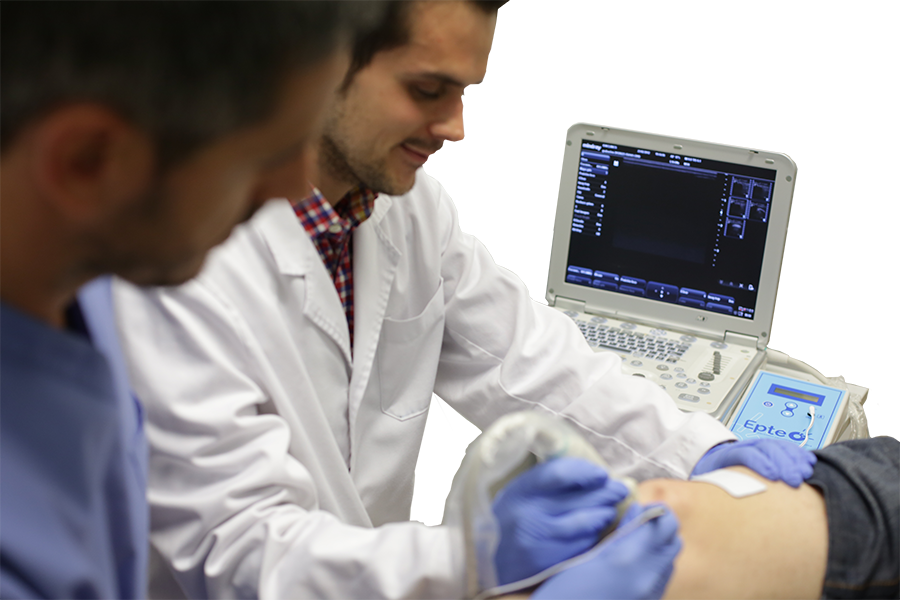Percutaneous Electrolysis Therapy (or EPTE®) is a technique for the treatment of different tendinopathies. EPTE® uses micro-currents (μA) applied via an acupuncture needle, to reach the tendon and produce an electrolysis phenomenon. The process of electrolysis destroys degenerated tissue and enhances a controlled inflammatory response in order to induce the natural recovery of the damaged structure.
Hundreds of professionalsare now using Percutaneous Electrolysis Therapy in their treatments, with optimal results. Following research findings and our experience, EPTE® can be considered a fast and effective approach (an average of 5 treatments, depending on the damage), and especially involves minimal pain for the patient who suffers from a tendinopathy.
Percutaneous Electrolysis Therapy (EPTE®) has offered several training sessions, not only in Spain, but also spread in foreign countries, such as Portugal or Mexico, and more than 1,200 physiotherapists have been trained throughout different courses. The main part of the course is eminently practical, teaching the necessary skills to apply the Percutaneous Electrolysis with accuracy in the most common pathological locations, based on an up-to-date scientific evidence of the percutaneous electrolysis effectiveness.
English training in Percutaneous Electrolysis Therapy EPTE®
The Percutaneous Electrolysis Therapy (EPTE®) course have a duration of 15 hours, and the professor will be Daniel Martín. Daniel works in the European University (Madrid) as coordinator and lecturer of a 3 course-long common itinerary of Sports Physiotherapy completely taught in English, along with clinical practice at his own consultation. Besides, he is one of the members of the training team of EPTE in Spain, and he has been in some EPTE® courses in Bilbao, Madrid, Sevilla, Valencia or Coimbra (Portugal), as a instructor.
Percutaneous electrolysis course: objectives
The objectives of the training will be the following:
- To provide the students the updated knowledge about tendon (histological changes, pathophysiology, physiotherapy approaches…), in order to make them able to apply the treatment correctly in the damaged area.
- To know the main features and effects derived from the use of galvanic microcurrents for the correct electrolysis approach.
- To obtain the anatomical, biomechanical and pathological knowledge of different tendon structures.
- To review the best scientific evidence available in relation to the clinical practice in tendinosis treatment.
- To give the student our professional experience developed during the last years in the electrolysis field to shorten recovery times.
- To improve different kind of therapeutic exercises and the weight necessary in controlling tendon dysfunction, based on scientific research.
- Manage with some different therapeutic approaches with a professional supervision/guidance.
Percutaneous electrolysis course: program.
The program of the EPTE® COURSE will include, in a resumed version, the following points:
- TENDON: Histology, epidemiology and mechanical properties
- TENDINOPATHIES Physiopatology. New researches. Tendon pain concept. Nerve ingrowth and neovascularisation.
- ECOGRAPHY Ecographic image and tendinosis diagnosis.
- SCIENTIFIC EVIDENCE of the use of electrolysis.
- TERAPEUTIC EXERCISE Isometric, concentric, eccentric exercise. New investigations and development.
- PERCUTANEOUS ELECTROLYSIS THERAPY, EPTE®. Device and application.
- TERAPEUTIC EPTE® APPLICATION in Patellar tendinopathy.
- TERAPEUTIC EPTE® APPLICATION in Achilles tendinopathy.
- TERAPEUTIC EPTE® APPLICATION in Plantar fascia tendinopathy.
- TERAPEUTIC EPTE® APPLICATION in Supraspinatus tendinopathy.
- TERAPEUTIC EPTE® APPLICATION in Epicondyle tendinopathy.
- TERAPEUTIC EPTE® APPLICATION in groin pain.
- Final recommendations

